- Home
- Alex Archer
Staff of Judea
Staff of Judea Read online
The Staff of Aaron…the sword of Joan of Arc.
After decoding an ancient scroll—one that purports to pinpont the treasure of the Jewish Temple, lost for two thousand years—archaeologist Annja Creed agrees to lead the party to recover the find in Judea. It’s a perilous desert journey through sandstorms and bandits, and complicated by mysterious sabotage within the group, to arrive at a long-forgotten fortress deep beneath a mountain. Only then does Annja discover that this archaeological expedition is really one man’s quest for the mystical Staff of Aaron, one of the Bible’s holiest and most powerful relics—a weapon they say can do incalculable harm in the hands of the wrong individual. She must try everything humanly possible to prevent the staff from being used for selfish purposes. Even if it puts her in the mightiest battle yet—sword against staff.
“Help! We’re under attack!”
Without waiting to see if anyone heard her, Annja stepped forward to face the oncoming threat. She didn’t know it, but she was smiling as she set her feet and prepared to meet the rider bearing down on her.
Annja could see the horse watching her as it came on, its round eyes glistening in the moonlight. Her first instinct was to bring the rider down by taking out his horse, but she found she couldn’t. The horse didn’t have a choice in being there and she couldn’t punish the animal for doing what it had been bred to do. So instead of targeting the horse, she changed her position slightly and prepared to deal with the rider himself.
He raced toward her, trying to spook her into running, but she held her ground. He guided his horse so that he would pass her on his right. His arm drew back and he raised himself slightly in his saddle, ready to deliver what he must have believed would be a killing strike with his sword.
The rider was ten feet away now.
Five.
Three.
Annja had a moment to take a deep breath and then horse and rider were upon her.
Titles in this series
Tear of the Gods
The Oracle’s Message
Cradle of Solitude
Labyrinth
Fury’s Goddess
Magic Lantern
Library of Gold
The Matador’s Crown
City of Swords
The Third Caliph
Staff of Judea
Destiny
Solomon’s Jar
The Spider Stone
The Chosen
Forbidden City
The Lost Scrolls
God of Thunder
Secret of the Slaves
Warrior Spirit
Serpent’s Kiss
Provenance
The Soul Stealer
Gabriel’s Horn
The Golden Elephant
Swordsman’s Legacy
Polar Quest
Eternal Journey
Sacrifice
Seeker’s Curse
Footprints
Paradox
The Spirit Banner
Sacred Ground
The Bone Conjurer
Tribal Ways
The Dragon’s Mark
Phantom Prospect
Restless Soul
False Horizon
The Other Crowd
Special thanks and acknowledgment to Joe Nassise for his contribution to this work.
Contents
Chapter 1
Chapter 2
Chapter 3
Chapter 4
Chapter 5
Chapter 6
Chapter 7
Chapter 8
Chapter 9
Chapter 10
Chapter 11
Chapter 12
Chapter 13
Chapter 14
Chapter 15
Chapter 16
Chapter 17
Chapter 18
Chapter 19
Chapter 20
Chapter 21
Chapter 22
Chapter 23
Chapter 24
Chapter 25
Chapter 26
Chapter 27
Chapter 28
Chapter 29
Chapter 30
Chapter 31
Chapter 32
Chapter 33
Chapter 34
Chapter 35
Chapter 36
Chapter 37
Chapter 38
Chapter 39
Chapter 40
Chapter 41
Chapter 42
Chapter 43
Chapter 44
Chapter 45
Chapter 1
The Monastery at Qumran
68 CE
“Quickly, my brothers!” the rabbi said, watching as the men around him packed the treasure into whatever receptacles they had on hand—clay jars, wooden boxes, rough burlap sacks, anything that could be used to transport it away from the monastery. The scrolls on the library shelves would be next; the precious documents would be placed in clay jars and stored in cliff caves in the wadi nearby.
Time was of the essence. He had received word that the dreaded Legio X Fretensis, the tenth legion of the sea strait, was marching in their direction and under orders to seize anything of value in the name of Titus.
Ordinarily this wouldn’t have been a concern. The rabbi and his people had lived under the Roman yoke for years now and had endured more than one visit from the emperor’s dogs. Each time it was the same. The troops would search the property, rifling cupboards, smashing crockery and generally making a mess of things. A few of them, including the rabbi, would be beaten or whipped for no better reason than that they were Jews. And then the troops would leave, not having found anything of interest. The rabbi and his followers were a community of scholarly ascetics, studying the Torah and what it meant to be the chosen of God. The only thing of value in the entire complex was the ever-growing collection of religious texts housed in the library, but since the Romans had no interest in the word of God these were always left alone.
These, however, were not ordinary times.
Rumors of change had been spreading for more than a year now. As tensions had risen throughout the spring and the air had grown heavy with talk of revolt and armed conflict, the high priest in Jerusalem had devised a plan to keep the temple treasures out of the hands of the Romans. Little by little the vaults had been emptied, the offerings of the faithful carried by trusted men to the small Essene community on the shores of the Dead Sea at Qumran. There they were delivered into the hands of the rabbi, a childhood friend of the high priest. The rabbi had the treasure cataloged, split into lots and then carried off again under the cover of darkness to hiding places scattered throughout the Negev Desert. Information concerning each cache was inscribed in a pair of scrolls, the first noting the type and location of the wealth, the second providing the necessary clues to correctly interpret the simple code used to obscure the locations in the first document. Both documents were needed to find the treasure. As soon as they were finished here the rabbi intended to make certain that the scrolls were sent to trusted followers in remote parts of the country, there to remain until it was safe.
The latest shipment from Jerusalem had come in four days before and they had barely begun cataloging it when word had reached them of the legion’s movement. Even worse, the same message told them that command of Fretensis had passed to Larcius Lepidus, a man known for his brutality and his love of confrontation. Give him half an excuse and Lepidus would burn the place to the
ground.
He began urging his people to work faster.
When the scrolls were finished, the rabbi called for a messenger. A young boy of no more than sixteen stepped up, and for a moment all the rabbi could do was blink.
So young, he thought. But then again, perhaps it was for the best. The Roman forces would be looking for one of his usual couriers, not this boy. And who was he to decide how a man—any man, young or old—should offer his life in the name of duty and faith?
The boy it would be.
“What is your name, son?” he asked.
“Jonathan, Rabbi.”
Jonathan. A good omen, that.
“Do you know what to do, Jonathan?”
The youth nodded. “I am to take the scroll to Elazar ben Yair at Masada. I am to give it to him personally and to no one else.”
The rabbi nodded. “And?”
Jonathan’s expression hardened but the rabbi was pleased that the boy did not waver as he said, “No matter what happens, I must not let myself or the scroll be captured by the Romans. I must destroy the scroll and sacrifice myself if necessary to prevent this.”
“Let us hope it does not come to that, eh?” He handed over the scroll, written on bronze.
Before the boy could respond, the door on the other side of the room burst open. It was Ephram, one of his senior disciples. The room’s light revealed the panic on the man’s face.
“The Romans are less than an hour’s march from the gates!” he cried.
So little time. The rabbi scolded himself. They would have time; the Lord would provide.
The rabbi turned back to the messenger, said a quick prayer over him and sent him on his way. He would either make it or he wouldn’t. It was out of the rabbi’s hands.
That took care of one of the scrolls, but the rabbi still had to deal with the second. He had intended to send a second messenger out by a different route in a few hours, but his plan had been predicated on the legion taking longer to reach them. Sending both scrolls out by messenger at the same time was far too risky. He could afford to have the Romans seize the first of the scrolls—without the second, the first was all but useless—but letting them get their hands on both was unthinkable. He would have to secure it much closer to home, for the time being, and hope he survived long enough to move it to a safer location. He pondered the problem for a moment and then decided that he would secret the copper scroll with the rest of the library texts that were even now being hidden in the caves of the wadi above the complex. It was unlikely the Romans would take the time to search there and the scroll would be protected from the elements.
The rabbi called to several of his men and instructed them on what he wanted done.
* * *
IT WAS JUST AFTER dawn when the Romans were sighted approaching the eastern gate of the Qumran complex. A few of the faithful remained with the rabbi, those who had refused his order to leave while they still had time to do so. They stood with him now just inside the gates, waiting for the arrival of the legion, and he was profoundly grateful for their presence.
It didn’t take long.
The first squad of foot soldiers rushed in and took up defensive positions facing them. It was always this way.
The real threat would be arriving momentarily.
The rabbi had never laid eyes on Larcius Lepidus but he knew him the moment he came in through the gate. Unlike most of the other Roman generals the rabbi had encountered in the past, this one did not stand on politics or ceremony. Where other generals had arrived in gleaming chariots or on magnificent horses, this one walked in like a common foot soldier, and indeed, he even resembled one in his arms and armor. The authority that surrounded him left little doubt that he was far more than that, however. The phalanx of troops parted before him like a cresting wave as he walked over and surveyed the men assembled before him, giving the rabbi time to study him in turn.
He was of average height, with a hard, uncompromising face and a sharp beak of a nose. A scar marked his left cheek.
“Who is in charge here?” he asked.
The rabbi stepped forward.
Lepidus glared at him. “Where is the treasure?”
The rabbi frowned. “We are a scholarly community with—”
That was as far as he got. Lepidus’s mailed fist crashed into the side of his face, sending him to the ground.
“Do not lie to me, Jew! I know the temple wealth is here, somewhere. Save yourself and your men and tell me where it is.”
Ignoring the blood dripping from his nose, the rabbi climbed to his feet and faced his tormentor. Even if he was inclined to tell the Roman what he wanted to know, which he most emphatically was not, admitting anything at this point was tantamount to treason. They would be tried, found guilty and crucified as enemies of the Empire.
“I do not know of any treasure,” the rabbi said.
A savage blow to the temple dropped him like a sack of dates. Darkness beckoned, but the general’s next words cut through the haze like a torch in the night.
“Burn it!” Lepidus cried. “Burn it all!”
Chapter 2
Jerusalem
“I’m sorry, but we couldn’t possibly take less than five.” Annja Creed stared dispassionately at the three men seated across the table from her, taking care to hide even the slightest hint of emotion. The item she was selling, an ossuary clearly of Jewish manufacture that contained the bones of a Roman soldier, was an oddity, all right, but wasn’t worth anywhere close to that price, she knew. The question was, did they?
The flight from New York to Jerusalem had taken twelve hours but she’d arrived the day before the meeting, giving her plenty of time to get acclimated to the time difference. She had awoken this morning, eager to face the challenge of dealing with the three gentlemen seated before her now.
She was not what they had expected. That much had been obvious when they had entered the room and practically fallen over one another in surprise when they found a woman waiting for them. It was precisely the reaction she and Roux, her sometime mentor, sometime partner, had been hoping for.
“They’ve no doubt spent hours studying what little information they can find on me, working out complicated strategies to deal with any possible move I might make in the negotiation,” he’d said when she reached him by phone earlier that morning. “Having you handling things will force them to throw all their carefully crafted plans right out the window. They’ll be off balance and scrambling to come up with a response. That’s when we’ll strike!”
And strike they had. Now it just remained to see if the fish took the bait.
The fish in question were named Cummings, Mortimer and Finch. Lawyers. High-priced ones at that. They were here representing the interests of Mitchell Connolly, the buyer who had contacted Roux several weeks ago with an interest in his ossuary. Annja had done her share of homework, too, after Roux had asked her to handle negotiations on his behalf. Connolly was the man behind a global empire built on mining rights and the exploitation of natural resources. He wasn’t as rich as Roux or Garin Braden, not by a long shot, but then again, he hadn’t had five hundred years to acquire his wealth the way those two had. Connolly was known to be both a savvy businessman and a cunning negotiator. It was this reputation, more than anything else, which had prompted Annja to accept Roux’s invitation to represent him. For someone as highly competitive as she was, the opportunity to pit herself against a man of Connolly’s reputation was one she just couldn’t resist.
She knew that as a collector Connolly was primarily interested in artifacts from the Roman occupation of Israel, most notably those from the First and Second Temple periods. The ossuary Roux was offering to sell had been dated to the year 50 CE, plus or minus a few decades, so it fit within that general time frame rather nicely. The fact that the bones insid
e it had been identified as European rather than Middle Eastern was what made the artifact unusual and, more than likely, had triggered Connolly’s interest.
Unfortunately, the media mogul must have come up with the same strategy Roux had, sending these three to negotiate in his place.
“Five million? Surely, you’re joking, Ms. Creed,” Cummings said, glancing at his two companions with a smug little smile. “We aren’t prepared to offer anything even close to that ballpark.”
Annja looked at them without saying anything. Cummings and Mortimer appeared to have been cut from the same cloth—large, overweight men in expensive suits. Both oozed arrogance, their expressions and body language telling her all she needed to know about their opinion of her. Finch, on the other hand, was the Laurel to their Hardy. Tall and thin, he was dressed in a dark suit that unfortunately made him look more like an old-time undertaker than a lawyer. To Annja’s surprise he seemed embarrassed by his colleagues. Apparently he hadn’t been at this long enough to build up the same kind of insufferable ego.
Handling this sale for Roux was a nice diversion from Chasing History’s Monsters. The cable television program on ancient mysteries and legends that she cohosted had grown in popularity over the past year. The program’s climb up the ratings chart had driven the need for new material, and her producer, Doug Morrell, had been all too happy to send her crisscrossing the globe to get it. In the process she’d managed to be involved with some groundbreaking discoveries and her status in the archaeological community had risen along with her popularity as a television star. The long hours and constant travel had been worth it, in that regard, but she was thankful that Roux had come along when he did. She hadn’t spent much time in Israel and she was looking forward to a few days to see the sights.
It seemed she was going to get to that sightseeing quicker than expected.
“I guess we’re finished, then,” she told them in the same unemotional tone she’d been using, and began to collect her things from the table.
There was a moment of silence, broken at last by Cummings. “What are you doing?” he asked in a strangled tone.
Annja looked up, the files in her hand half in and half out of her briefcase. Cummings looked like a fish out of water. It was all she could do to keep from laughing.

 Rogue Angel: Forbidden City
Rogue Angel: Forbidden City The Spider Stone
The Spider Stone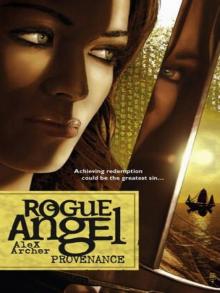 Provenance
Provenance Blood Cursed
Blood Cursed Fury's Goddess
Fury's Goddess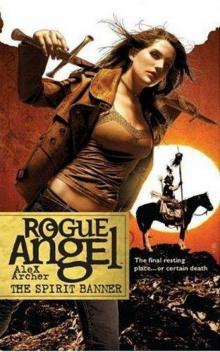 The Spirit Banner
The Spirit Banner Footprints
Footprints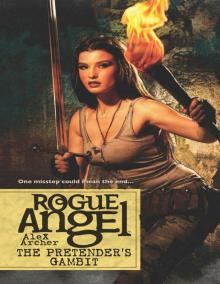 The Pretender's Gambit
The Pretender's Gambit Rogue Angel: The Lost Scrolls
Rogue Angel: The Lost Scrolls Staff of Judea
Staff of Judea Rogue Angel 55: Beneath Still Waters
Rogue Angel 55: Beneath Still Waters The Mortality Principle
The Mortality Principle Warrior Spirit
Warrior Spirit Paradox
Paradox Tear of the Gods
Tear of the Gods Forbidden City
Forbidden City River of Nightmares (Rogue Angel)
River of Nightmares (Rogue Angel) Rogue Angel: The Secret of the Slaves
Rogue Angel: The Secret of the Slaves Destiny
Destiny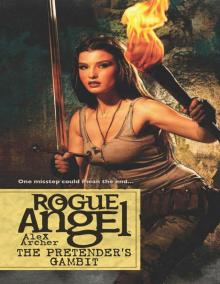 Rogue Angel 51: The Pretender's Gambit
Rogue Angel 51: The Pretender's Gambit Celtic Fire
Celtic Fire Rogue Angel 54: Day of Atonement
Rogue Angel 54: Day of Atonement Day of Atonement
Day of Atonement Rogue Angel: Gabriel's Horn
Rogue Angel: Gabriel's Horn Grendel's Curse
Grendel's Curse The Matador's Crown
The Matador's Crown Rogue Angel: The Chosen
Rogue Angel: The Chosen The Other Crowd
The Other Crowd Seeker’s Curse
Seeker’s Curse Rogue Angel 52: Death Mask
Rogue Angel 52: Death Mask The Golden Elephant
The Golden Elephant Blood Cursed (Rogue Angel)
Blood Cursed (Rogue Angel) Celtic Fire (Rogue Angel)
Celtic Fire (Rogue Angel) Gabriel's Horn
Gabriel's Horn Magic Lantern (Rogue Angel)
Magic Lantern (Rogue Angel) God of Thunder
God of Thunder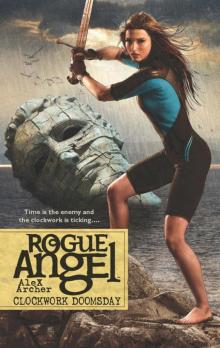 Clockwork Doomsday
Clockwork Doomsday The Bone Conjurer
The Bone Conjurer Treasure of Lima
Treasure of Lima The Soul Stealer
The Soul Stealer The Dragon’s Mark
The Dragon’s Mark Restless Soul
Restless Soul Rogue Angel: God Of Thunder
Rogue Angel: God Of Thunder Rogue Angel 49: The Devil's Chord
Rogue Angel 49: The Devil's Chord Death Mask
Death Mask Rogue Angel 46: Treasure of Lima
Rogue Angel 46: Treasure of Lima Swordsman's Legacy
Swordsman's Legacy The Oracle's Message
The Oracle's Message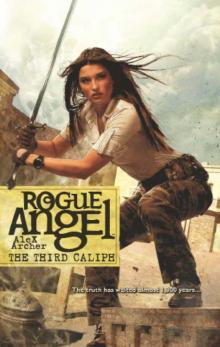 The Third Caliph
The Third Caliph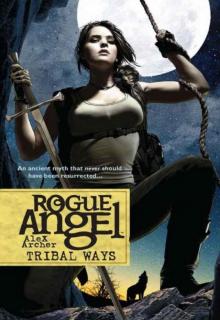 Tribal Ways
Tribal Ways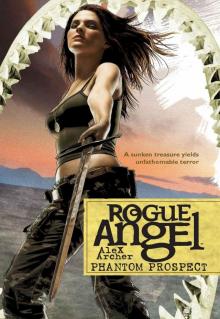 Phantom Prospect
Phantom Prospect Rogue Angel 50: Celtic Fire
Rogue Angel 50: Celtic Fire Library of Gold
Library of Gold Rogue Angel 53: Bathed in Blood
Rogue Angel 53: Bathed in Blood Sacred Ground
Sacred Ground The Devil's Chord
The Devil's Chord Serpent's Kiss
Serpent's Kiss The Vanishing Tribe
The Vanishing Tribe Sunken Pyramid
Sunken Pyramid Sunken Pyramid (Rogue Angel)
Sunken Pyramid (Rogue Angel)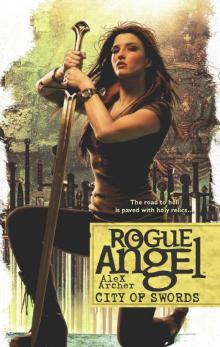 City of Swords
City of Swords Bathed in Blood
Bathed in Blood The Lost Scrolls
The Lost Scrolls The Babel Codex
The Babel Codex Mystic Warrior
Mystic Warrior Eternal Journey
Eternal Journey Beneath Still Waters
Beneath Still Waters Solomon's Jar
Solomon's Jar Beneath Still Waters (Rogue Angel Book 55)
Beneath Still Waters (Rogue Angel Book 55) Cradle of Solitude
Cradle of Solitude Secret of the Slaves
Secret of the Slaves River of Nightmares
River of Nightmares Polar Quest
Polar Quest False Horizon
False Horizon